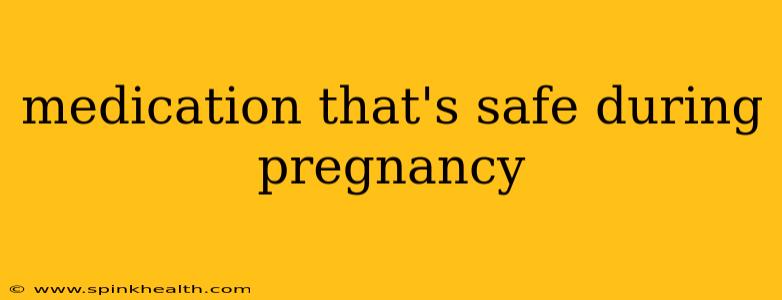Pregnancy is a transformative journey, a time of incredible change and anticipation. But with this beautiful experience comes a unique set of considerations, especially when it comes to medication. Many expecting mothers find themselves facing the challenging question: what medications are safe to take during pregnancy? This isn't a question with a simple answer, as it deeply depends on various factors, including the specific medication, the stage of pregnancy, and your individual health circumstances.
This guide aims to shed light on this crucial topic, offering information and guiding you towards making informed decisions in consultation with your healthcare provider. Remember, this information is for educational purposes only and does not constitute medical advice. Always consult your doctor or other qualified healthcare professional before taking any medication during pregnancy.
What Medications Are Considered Safe During Pregnancy?
The truth is, very few medications are definitively deemed "completely safe" throughout all stages of pregnancy. The categorization of medications often uses a system of risk levels, understanding that potential risks can vary depending on the trimester and the specific drug. Your doctor will assess your individual needs and weigh the potential benefits of a medication against its potential risks to both you and your baby.
Some medications generally considered relatively safe in pregnancy, when prescribed and monitored by a doctor, include:
- Folic acid: Crucial for preventing neural tube defects in the developing fetus. Often prescribed as a prenatal vitamin.
- Certain antibiotics: Some antibiotics are safe to use during pregnancy, but the specific choice depends on the infection and the stage of pregnancy.
- Insulin: For women with diabetes, properly managed insulin is vital for both maternal and fetal health.
- Thyroid medication: Women with hypothyroidism often need to continue their medication throughout pregnancy.
However, it's crucial to understand that even these medications require careful monitoring and dosage adjustments under a doctor's supervision. What's safe for one person may not be safe for another, depending on individual circumstances.
What Over-the-Counter Medications Are Safe During Pregnancy?
Over-the-counter (OTC) medications present another layer of complexity. While some seem innocuous, many OTC drugs should be approached cautiously during pregnancy. Always check with your doctor or pharmacist before taking any OTC medication, even something you've used before.
What OTC Pain Relievers Are Safe to Use During Pregnancy?
This is a frequently asked question. Generally, acetaminophen (Tylenol) is considered the safest pain reliever for occasional use during pregnancy. However, even with acetaminophen, moderation is key. Avoid taking it regularly without consulting your doctor. Ibuprofen (Advil, Motrin) and naproxen (Aleve) should generally be avoided, especially during the later stages of pregnancy, as they can increase the risk of complications.
Are There Medications I Should Absolutely Avoid During Pregnancy?
Yes. Many medications are known to pose significant risks during pregnancy and should be avoided at all costs unless absolutely necessary and under strict medical supervision. These often include:
- Nonsteroidal anti-inflammatory drugs (NSAIDs): As mentioned above, these should be avoided, especially later in pregnancy.
- Certain antidepressants: Some antidepressants can pose risks to the developing fetus. Your doctor will work with you to find the safest approach to managing your mental health during pregnancy.
- Retinoids (like Accutane): These can cause severe birth defects.
- Warfarin (Coumadin): This blood thinner should be avoided unless absolutely medically necessary and under close monitoring.
What About Herbal Remedies and Supplements During Pregnancy?
The safety of herbal remedies and supplements during pregnancy is often unclear. Many haven't undergone rigorous testing for safety in pregnancy. Always consult your doctor before using any herbal remedies or supplements during pregnancy. What may seem harmless can potentially interact negatively with other medications or have unforeseen effects on the developing fetus.
How Can I Discuss Medication Safety with My Doctor?
Open communication with your healthcare provider is paramount. Don't hesitate to discuss all medications you are taking, considering taking, or have taken recently. Bring a complete list of your medications, including any OTC drugs, supplements, or herbal remedies. Your doctor can assess your specific situation, considering your health history and current needs, to determine the safest course of action.
What are the potential risks of taking medication during pregnancy?
The potential risks vary greatly depending on the medication and the stage of pregnancy. Some medications can cause birth defects, premature birth, low birth weight, or other complications. Others might directly affect the mother's health, indirectly impacting the pregnancy.
How can I minimize the risk of taking medication during pregnancy?
Always consult your doctor before taking any medication, including over-the-counter drugs, herbal remedies, and supplements. If possible, explore non-pharmacological approaches to managing your symptoms, such as rest, diet changes, or alternative therapies. Keep a detailed record of all the medications you take, including dosages and timing.
Remember, this information is for general knowledge and does not replace professional medical advice. Your healthcare provider is your best resource for personalized guidance on medication safety during pregnancy. Your health and the health of your baby are paramount, and making informed decisions with the guidance of your doctor is crucial for a healthy pregnancy.

